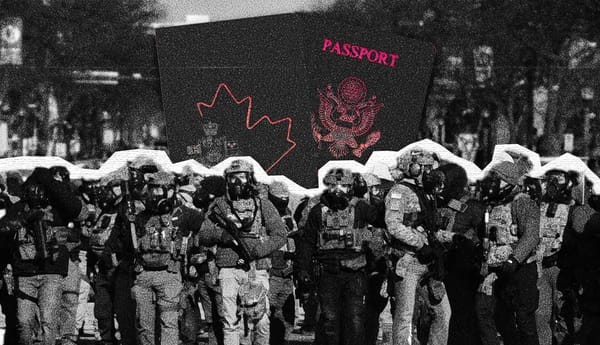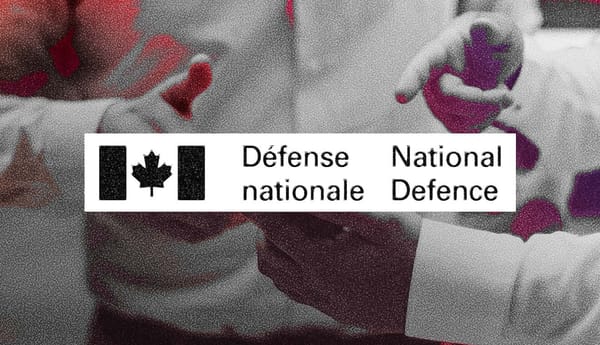The Royal Canadian Mounted Police (RCMP) investigated a complaint about me after the publication of Find IDF Soldiers, a database of Canadians that have joined the Israeli military.
I learned through a privacy request made to the RCMP that the federal police service received a complaint via its public National Security Information Network (NSIN) form on Feb. 25, 2025, a day after Find IDF Soldiers was first published. The RCMP notes that the form is for “reporting non-urgent threats to national security.”
The complaint made through the form claimed: “This website is sharing private information about Canadian citizens who ha e [sic] served in the Israeli Defence Forces [sic] without permission to share this information. Given the current situation in the middle east, this website endangering [sic] the lives of these people and their families and the founder David Mastracci [sic] should be charged.”
The Find IDF Soldiers website states: “This is not a doxxing website. Every profile is based entirely on public information gathered through simple Google searches from news articles, social media profiles, newsletters, websites, public directories and other sources. This information is also not being collected and republished here to encourage any harassment of the individuals named.”
The NSIN complaint was screened the day it was received by a supervising officer, who marked its “risk level” as “low” but determined that it “requires further investigation.”
On March 31, the complaint was reviewed by an RCMP analyst who “carded” me, according to the disclosure package I received. This entailed searching my name in the following police databases: CPIC (Canadian Police Information Centre), NSIN (National Security Information Network), PIP (Police Information Portal) and PROS (Police Reporting and Occurrence System).
All of these searches were marked as “negative,” meaning no results for me were found.
The analyst then conducted an “open sourse” (sic) check for me, which found a “positive” result: my public author profile on The Maple’s website. A screenshot of my author profile at the time of the search was uploaded to the information file opened by the analyst.
It is possible the analyst conducted a more extensive search of public information for me but that no notes were made about doing so, meaning it wouldn’t appear in the disclosure package, according to an expert I interviewed.
I asked the RCMP if they conducted any searches not captured in the disclosure package they provided me. I also asked if they received any other complaints about me and/or Find IDF Soldiers through their NSIN form. They failed to respond.
Kevin Walby is a professor in the criminal justice department at the University of Winnipeg whose research specialties include “policing, security, surveillance” and “access to information and freedom of information law.”
Walby told me that because the RCMP’s letter to me accompanying its disclosure package stated that the agency only released “some information,” it is possible it withheld relevant files. He added, “I’m in no way confident that they [the RCMP] ever disclose everything that they have.”
After conducting their search, the RCMP analyst wrote: “Open sourse [sic]: Davide Mastracci is the opinion editor at The Maple news outlet. https://findidfsoldiers.com/soldiers/. File for information.”
The report was then reviewed by the supervising officer who initially screened it, and on April 11 it was marked as concluded, with the following “clearance status”: “Complete - solved (non-criminal).”
The supervising officer, who is also listed as the “acting team lead” of the RCMP Operational Coordination Centre, wrote: “Entities entered into PROS.”
The report does not specify who the “entities” are, but notes that the analyst “carded entities” and that I was carded. The report also lists me as one of two “involved persons.” As such, it’s likely that I’m an “entity” and am now in this police database, according to several experts I consulted with. The identity of the other “involved person” was redacted.
I asked the RCMP to confirm that I was one of the “entities” added into PROS. They failed to respond.
A 2011 report on a federal audit of the RCMP’s databases states: “PROS is a complete occurrence and records management system containing information on individuals who have come into contact with police, either as suspects, victims, witnesses or offenders, from initial occurrence to final disposition. PROS is used by the RCMP and 23 police partner agencies as their operational records management system. About 1.6 million occurrence files are processed per year.”
Jeffrey Monaghan, an associate professor at Carleton University’s Institute for Criminology and Criminal Justice with a primary research interest in “policing and surveillance practices,” told The Maple, “Being included within national security data banks and having your data passed along to other policing data banks is never good [...] We know very little about how this data travels and how it gets re-used, retained, deleted.”
I asked the RCMP: 1) If PROS is still used by 23 “partner agencies,” and if not, what the correct number is now; 2) For a full list of the “partner agencies”; 3) If the file on me and/or any related information was shared with or accessed by any other federal, provincial, or foreign agency, including the Canadian Security Intelligence Service, the Canada Border Services Agency, Global Affairs Canada, and Public Safety Canada.
The RCMP failed to respond.
Walby told me that the RCMP deciding to screen the complaint about me and Find IDF Soldiers suggests “any sloppy snitch note like this sent into their weird little portal could result in them running anybody’s name, and one would think that they would want to have more reasonable, probable grounds to run names in a database or add names to a database.”
Monaghan stated, “Perhaps the biggest concern here is that the tip went to a second stage, then got translated into a potential incident file that’s retained. Sure, a shoddy tip got submitted. But that’s why there’s a screening mechanism. In this case, it’s puzzling how such a vacuous non-criminal issue would get sent-on for secondary analysis.”
Walby added that in his experience, it has been “unprecedented” to see a journalist’s name appear in an RCMP file in this manner, and that, “Journalists should be concerned about it, because there could be a huge chilling effect on doing investigative journalism, if that is treated like it was some kind of transgression or crime against the state.”
Monaghan agreed, stating: “It’s extremely concerning that journalists are getting vetted by national security agencies.”
I asked the RCMP why the screener of the complaint decided it required further investigation. They failed to respond.
In the days and weeks after Find IDF Soldiers was published, I came across claims in online statements and articles that critics of the project had reported it to law enforcement agencies, which is what prompted me to file the RCMP personal information request and several others.

For example, on February 28, a joint statement from ARZA Canada, Reform Jewish Community of Canada and Reform Rabbis of Canada stated: “In response to [the publication of Find IDF Soldiers], legal efforts are already underway to address this harmful publication. While these steps are being pursued, we strongly encourage any congregation or individual who feels at risk to immediately contact their local law enforcement agency. Ensuring that authorities are aware of the situation and any related security concerns is an essential measure in safeguarding our community.”
In addition, a March 9 article from The Canadian Jewish News stated that a parent of an individual included in the database had been in contact with “law enforcement officials” and “had sought to launch a complaint with Toronto Police Services.” The parent stated, “We’d [referring to a group of families] like to shut down the entire operation.”
Multiple Israeli government officials and elected officials have also commented on the project.
The Maple has not been contacted by any law enforcement agency on any matter, including the publication of Find IDF Soldiers.
On June 4, in response to a report from the Toronto Star, the RCMP confirmed that in early 2024 it had launched a “structural investigation” into potential war crimes in Gaza, stating: “It is important to emphasize that a structural investigation is not a criminal investigation. [...] Should a perpetrator of core international crimes—such as genocide, war crimes, or crimes against humanity—with the appropriate nexus to Canada be identified, the RCMP will initiate a separate criminal investigation. To date, the RCMP has not initiated any related criminal investigations.”
Some media outlets reporting on the announcement mentioned the Find IDF Soldiers database as a potential instigating factor for the investigation and/or a source of information for the RCMP.
There is no evidence for these claims. The RCMP investigation began a year before Find IDF Soldiers was launched, and the project explicitly states that it is not accusing any of the soldiers of war crimes. Instead, the website states: “We’re interested in learning more about who Canadians that have joined the Israeli military are, why they made the choice they did, who or what influenced them to do so, what they did while in the military, and how they may feel about it.”
A review of The Maple’s mailing list has revealed a senior analyst at the RCMP’s Access to Information and Privacy Branch signed up to receive emails after the project’s launch.
Several overdue privacy requests to other law enforcement agencies and government departments have yet to receive a formal response. The Maple will report on any of them that indicate investigations into the project and/or me, should any exist.
The Maple rejects any allegation that Find IDF Soldiers is criminal, hateful or defamatory. Our work on the project will continue.








